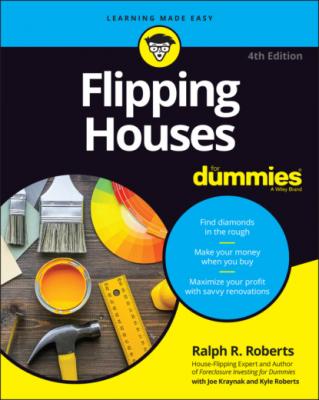ТОП просматриваемых книг сайта:
Flipping Houses For Dummies. Ralph R. Roberts
Читать онлайн.Название Flipping Houses For Dummies
Год выпуска 0
isbn 9781119861034
Автор произведения Ralph R. Roberts
Жанр Недвижимость
Издательство John Wiley & Sons Limited
For more information on FHA mortgage related questions, visit http://portal.hud.gov/hudportal/HUD.
Plan B: Surviving a Flip That Flops
Throughout this book, I provide tips, tricks, and warnings to enable you to maximize your profit and minimize your risks, but that doesn’t guarantee a successful flip every time. Flips sometimes flop, even for experienced investors. The following tips can help you avoid some of the more serious situations and recover your composure when something goes wrong:
If your flip flops because of a dip in the housing market, skip to Chapter 20 to explore other ways to profit from your investment.
As soon as you see that a property is a money pit, cut your losses. Don’t throw good money after bad. You may need to sell the house now at a small loss instead of later at a bigger loss. On the other hand, you can go to plan C and rent out the property for 12 to 36 months until the market perks back up and you can comfortably sell the home at or above cost.
Keep in touch with your team, especially your financial backers and agent. Communication is paramount, especially when times are bad. Good team members can help you out of a jam and help you recover.
Chapter 3
Building Your Dream Team
IN THIS CHAPTER
No one can whistle a symphony. It takes a whole orchestra to play it.
—H.E. LUCCOCK
Most people who talk themselves out of investing in real estate are defeated by a false assumption — that they have to do it alone. The truth is that you don’t have to do it alone. In fact, attempting to fly solo is one of the most common and serious blunders you can make when you’re getting started. Investors who excel at flipping houses are team builders, capable of selecting talented players, coordinating their efforts, and harnessing their skills.
By surrounding yourself with a team of experienced and talented people, all you really need to succeed is a smartphone, some people skills, and a long list of qualified individuals with diverse talents. You don’t know what a house is truly worth? Consult a qualified real estate agent. You’re not good with money? Hire an accountant. Can’t hammer a nail? Call a carpenter.
Sure, hiring these additional people costs extra, but as long as you can accurately estimate the total costs, calculate them into your budget, and still profit from the flip, you win. (See Chapter 11 for details on calculating costs.)
I don’t have all the essential qualities to successfully flip houses. What I do have is the ability to admit that I lack certain qualities and a knack for finding people who complement my skills. In this chapter, I show you how to build your own house flipping dream team.
Teaming Up with a Quality Real Estate Agent
Real estate agents (or house hunters) who know the ropes and have the right contacts can assist you in managing the two transactions that are critical to your success — purchasing a house at less than market value and selling the rehabbed house quickly at a profit. In the following sections, I explain the beneficial services that agents can provide and give you guidance on finding the best agents for your flipping needs.
Recognizing the value of an agent
A good real estate agent is more than just a clerk who pushes paperwork through the system and juggles numbers. The right agent is more like the concierge at an upscale hotel — dedicated to serving your (real estate) needs, whatever they may be. Sure, a qualified real estate agent costs money — typically, a 6 to 8 percent commission — but when you consider the amount of money you’re investing, a single mistake can cost you tens of thousands more. A real estate agent who has plenty of experience working with investors can assist you with these tasks:
Helping you track down investors and other sources of cash. (See Chapter 4 for more about financing your flips.)
Finding houses that meet your search criteria, even when those houses aren’t actively advertised as being on the market. (See Part 2 of this book for more about finding properties to flip.)
Assisting in evaluating properties that you may want to purchase to avoid overpaying for a property. (See Chapters 9 and Скачать книгу

